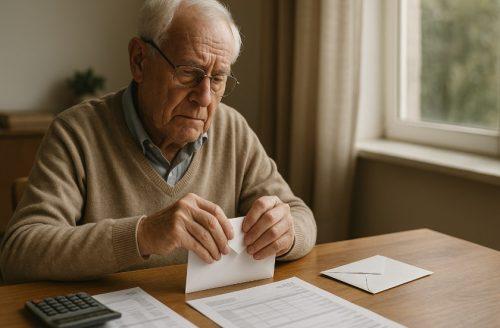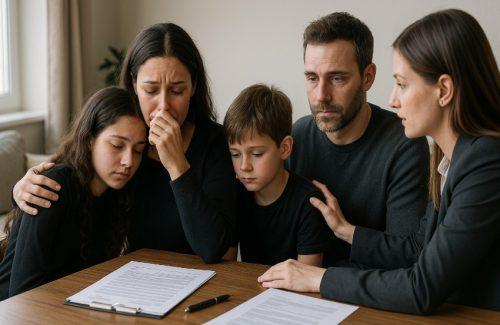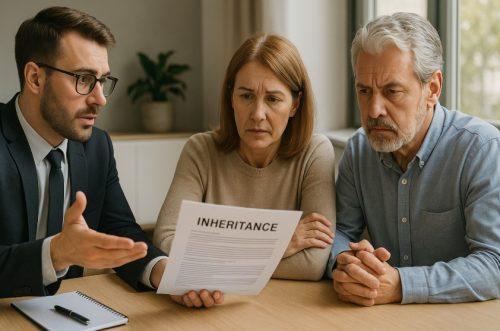Have you ever wondered what happens to your State Pension after you pass away? It’s a question many people don’t think about until later in life, yet it’s an essential part of planning for your family’s financial future.
While your State Pension generally stops once you die, certain circumstances may allow your spouse or civil partner to inherit part of it. However, the rules can be complex, especially with changes that have taken place over the years.
Understanding your options in advance ensures your loved ones aren’t left confused or financially unsupported. From inheritance rights to claiming lump sums, this guide covers everything you need to know in a clear, straightforward way.
Whether you’re making decisions now or just planning ahead, it helps to know where your State Pension stands when life ends. Let’s start with the most basic question of all, does your pension continue after death?
Does the State Pension Stop When You Die?

When you pass away, your State Pension payments will stop immediately. The Department for Work and Pensions (DWP) should be notified as soon as possible so they can end the payments. This ensures that no overpayments are made, which would later need to be repaid.
Typically, your pension ceases the day you die. However, if a payment has already been made for a period after that date, it must be returned. For instance, if you were paid in advance for a month but passed away halfway through, the extra amount will be recovered.
Here’s what happens when the DWP is informed of a death:
- Your National Insurance number is flagged and checked across pension systems.
- State Pension payments are automatically stopped.
- Any overpaid amounts are reclaimed from your estate or executor.
If the death is not reported promptly, complications may arise. The Tell Us Once service helps streamline the process by notifying multiple government departments at once, including HMRC, DWP, and the Passport Office. You or your representative can use this service to ensure all departments are updated efficiently.
In summary, your State Pension does not continue after death, but there may be cases where your partner could receive part of it. We’ll look at those scenarios next to help you better understand what happens to the money you’ve built up.
Can Your Spouse or Civil Partner Inherit Your State Pension?
Yes, in certain circumstances, your spouse or civil partner can inherit some of your State Pension after you die. This depends largely on two factors: your National Insurance (NI) contributions and when both of you reached State Pension age.
The inheritance rules vary depending on whether you received the Basic State Pension (before 6 April 2016) or the New State Pension (after 6 April 2016).
For the Basic State Pension:
- Your spouse or civil partner may inherit your Additional State Pension if you built one up.
- They may also be able to use your NI contributions to improve their own pension.
- They must not have remarried or entered another civil partnership.
For the New State Pension:
- Your partner might inherit an extra payment, such as protected payments, if you contributed more than the standard entitlement.
- They will not inherit your entire pension, but could receive an increased amount on their own pension.
- The amount depends on your NI record and any protected payments you qualified for.
Things to consider:
- Only legal spouses or civil partners can inherit the State Pension, unmarried partners cannot.
- Your partner must contact the Pension Service to determine what they may be entitled to.
So, while your pension doesn’t carry on indefinitely, part of it may continue helping your partner financially.
What Happens to Your State Pension Lump Sum if You Die?
If you chose to defer your State Pension and passed away before claiming it, a lump sum payment may be due to your estate. This is particularly relevant if you delayed taking your pension for at least 12 consecutive months and were eligible for the Basic State Pension.
When deferral rules apply:
- A one-time lump sum payment may be issued based on the amount of pension you would have received.
- Interest is usually added to this payment.
- This sum is not automatically transferred and must be claimed by your spouse or estate executor.
For those who reached State Pension age after 6 April 2016 (under the New State Pension), deferral increases your weekly payments instead of generating a lump sum.
If you die before claiming these increased payments:
- The extra amounts do not automatically go to your partner.
- However, protected payments may still be passed on, depending on your NI contributions and relationship status.
Important notes:
- You must not have claimed the pension before your death for the lump sum to be eligible.
- Any unclaimed lump sum must be requested within a 12-month period from the date of death.
- Contacting the Pension Service promptly helps avoid delays or loss of entitlement.
In essence, a deferred State Pension can offer a valuable lump sum for your loved ones, but only under specific conditions that need timely action.
What Benefits Can Your Family Claim After You Die?

When you pass away, your family may be entitled to financial support through government bereavement benefits. These are designed to provide short-term relief and are separate from pensions. Understanding what’s available and how to claim them can help your loved ones stay financially stable during a difficult time.
What is Bereavement Support Payment?
Bereavement Support Payment is a benefit provided to help spouses or civil partners cope financially after the death of their partner. It replaces older benefits like the Bereavement Allowance and Widowed Parent’s Allowance.
- It consists of a lump sum payment and up to 18 monthly payments.
- The lump sum is £3,500 for people with children and £2,500 for those without.
- Monthly payments are £350 (with children) or £100 (without).
You won’t be taxed on these payments, and they don’t affect other benefits for the first year.
Who Qualifies for It?
To be eligible for Bereavement Support Payment:
- You must have been under State Pension age at the time of your partner’s death.
- Your partner must have paid National Insurance contributions for at least 25 weeks, or their death must have been work-related.
- You must have been married or in a civil partnership with the deceased when they passed away.
- Cohabiting partners (who are not married or in a civil partnership) are generally not eligible, even if they shared children.
The claim must be made within 21 months of the death to receive full entitlements.
How and Where to Apply?
You can apply for Bereavement Support Payment in several ways:
- Online via the official GOV.UK portal.
- By phone through the Bereavement Service helpline.
- By post using the downloadable form available from GOV.UK.
Key details you’ll need include your partner’s National Insurance number, your bank details, and date of death. It’s advised to apply as soon as possible to avoid missing out on the full amount.
In short, Bereavement Support Payment offers a financial buffer to help deal with sudden loss. It’s essential to act quickly and check the eligibility criteria to ensure your family doesn’t miss out on available support.
What About Other Types of Pensions (Private and Workplace)?
Besides the State Pension, many people also have workplace or private pensions. These pensions often include death benefits and offer more flexibility in what your loved ones can inherit. The specific rules and outcomes will depend on the type of pension you hold and your age at death.
What Happens to Defined Contribution Pensions?
Defined contribution pensions are based on how much you and your employer contributed over time, along with investment growth. These pensions are often part of workplace or personal pension schemes.
If you die before age 75:
- Your beneficiaries can usually inherit the full amount tax-free.
- They can choose to take a lump sum, set up a flexible drawdown, or buy an annuity.
If you die after age 75:
- The same options are available.
- However, any income your beneficiaries draw will be taxed at their marginal rate.
If you’re already drawing down from your pension:
- The remaining amount can still be passed on.
- Your loved ones can continue receiving income or switch to a different method, like a lump sum or annuity, depending on the provider.
What Happens to Defined Benefit Pensions?
Defined benefit pensions are based on your salary and the length of time you worked for your employer. These pensions often provide more structured death benefits but are governed by scheme-specific rules.
If you die before retirement:
- A lump sum is often paid, usually two to four times your salary.
- It’s generally tax-free if you’re under 75 and the payment is made within two years.
If you die after retirement:
- A reduced pension is typically paid to a surviving spouse, civil partner, or dependent child.
- This income is taxable under standard income tax rules.
Your scheme may also offer:
- Pension protection lump sums for deaths within a guaranteed payment period.
- Refunds of contributions if you die before accessing your pension.
- Trivial commutation lump-sum death benefits if remaining pension value is below £30,000.
In both pension types, nominating a beneficiary and keeping your records updated is crucial. That way, your loved ones can access these benefits without legal delays.
How Does Inheritance Tax Affect Pensions After Death?

Inheritance Tax (IHT) has traditionally not applied to most pensions, but this will change from April 2027. If you’re planning for the future, understanding the tax implications on death is vital for estate planning. At present, pensions sit outside of your estate, meaning beneficiaries typically do not pay IHT on them.
However, new rules from the Autumn 2024 Budget mean:
- Unused pension savings will count as part of your estate.
- These could be subject to IHT if your estate exceeds the IHT threshold.
The standard threshold is £325,000, and assets above this are taxed at 40%.
Whether tax applies also depends on:
- Who receives the money: Payments under trustee discretion may be excluded.
- Timing of the payment: If paid within two years of death, certain lump sums can be tax-free.
- Your age at death: Dying before 75 offers more favourable tax treatment.
Other key points:
- Annuity payments and drawdowns inherited after age 75 are taxed as regular income.
- Discretionary schemes can avoid IHT if benefits are not directed by the deceased.
With upcoming changes, it’s essential to seek professional advice. This ensures your pension benefits are passed on efficiently without unintended tax consequences for your family.
Who Decides Who Gets Your Pension?
When you die, your pension doesn’t automatically go to your next of kin. Instead, the process of deciding who receives your pension depends on your provider, the type of pension, and whether you’ve nominated a beneficiary. If you’ve taken steps in advance, your wishes will often be respected, but not always guaranteed.
In most cases, pension providers allow you to complete an Expression of Wish form. This allows you to nominate one or more individuals who you’d like to receive your pension benefits when you die. These nominations help guide the scheme administrators, but they are not legally binding.
Key points about nomination:
- If your pension is under a discretionary trust, trustees or providers make the final decision.
- If the pension is under direction, the named individual(s) must receive the funds, and they become part of your taxable estate.
- If no nomination exists, the provider will look at your next of kin or legal dependants.
Things to remember:
- Update your nomination after major life changes (e.g. marriage, divorce, childbirth).
- Unmarried partners are not automatically eligible, unless nominated.
- Some workplace schemes will still apply their internal rules, even with a nomination.
Ultimately, while you can express who should inherit your pension, the scheme’s legal setup and administrator’s discretion determine the outcome. Keeping your documentation current is essential to ensure your intentions are followed.
What Should Your Family Do to Notify Pension Authorities?
When someone dies, notifying the relevant pension providers promptly is essential. This helps avoid overpayments and ensures any death benefits can be processed efficiently. Delays can lead to complications and even loss of entitlement in some cases.
The first step is to use the Tell Us Once service, available through GOV.UK. This allows you to notify multiple government departments, including HMRC, the Passport Office, and DWP, in one go.
To notify the State Pension authority, your family or representative should:
- Contact the Pension Service directly via phone or post.
- Provide the deceased’s National Insurance number, death certificate, and date of death.
- If a lump sum or any benefits are due, the service will guide you through the claims process.
For workplace or private pensions, they should:
- Check paperwork or digital accounts to find pension providers.
- Contact each provider individually to report the death.
- Prepare to submit documents such as the final death certificate, will or probate information, marriage certificate if applicable, and executor or administrator details.
Some providers may send their own forms to be completed by the person handling the deceased’s affairs. It’s important to respond promptly and follow all their instructions.
In short, early notification not only prevents financial issues but also speeds up any benefits or inheritance being distributed to the correct beneficiaries.
Can You Take Your Pension Early If You’re Terminally Ill?

In the case of terminal illness or serious health conditions, it may be possible to access your pension early. The rules for this vary based on the type of pension and the severity of your condition, but they can provide critical financial support during a difficult time.
What is Ill-Health and Terminal Illness Retirement?
If you’re diagnosed with a terminal illness, defined as having a life expectancy of less than 12 months, you may be eligible for ill-health retirement. This allows you to access your workplace or private pension earlier than usual.
- Your pension scheme may allow full access to your pot, potentially as a tax-free lump sum if you’re under 75.
- Scheme rules differ, so contacting your pension provider directly is essential.
For less severe illnesses, early retirement due to ill-health is also possible but may come with reduced payments.
What are the Rules Around Tax-Free Lump Sums?
Under terminal illness rules:
- You can usually take your full pension pot as a tax-free lump sum, provided you’re under 75.
- If you’re over 75, tax will be applied at your normal income rate.
- The payment may reduce other benefits or insurance payouts, so always check with your provider or financial adviser.
If you’re claiming a serious ill-health lump sum, you’ll need medical evidence from a GP or specialist.
What Are the State Pension Rules and Limitations?
The State Pension does not allow early access under any health circumstances. You can only start receiving it once you’ve reached the official State Pension age. If you’re unable to work due to illness before this age, you might qualify for:
- Employment and Support Allowance (ESA)
- Universal Credit
- Personal Independence Payment (PIP)
So while you can access private or workplace pensions early under health grounds, the same flexibility does not apply to the State Pension.
Inheriting State, Private, and Workplace Pensions
Understanding the inheritance rules for each type of pension helps your family prepare for what to expect. The benefits, eligibility, and tax treatment vary significantly depending on the pension type and your age at death.
Here’s a helpful breakdown:
| Type of Pension | Inheritable? | Tax-Free? | Key Conditions |
| State Pension | Partially | No | Spouse or civil partner only; NI record affects amount |
| Defined Contribution | Yes | Yes, if under 75; taxed if over | Depends on age, nomination, and provider rules |
| Defined Benefit | Yes | Lump sum tax-free if under 75 | May provide survivor’s pension; depends on scheme rules |
| Deferred State Pension | Yes | A lump sum may be payable | Only if deferred and not yet claimed |
| Annuities | Limited | Depends on type (joint-life, etc) | Must be set up to include survivor benefits |
This table is only a general guide. Each pension scheme has specific terms, and your beneficiaries should always contact providers to understand their entitlements fully.
How to Get Expert Help With Pensions After Death?
Dealing with pensions after someone dies can be overwhelming. Fortunately, several free and independent resources are available to help guide you through the process. Whether you’re trying to claim benefits, understand tax implications, or plan ahead, expert support is accessible.
Here are some places to get reliable pension advice in the UK:
- MoneyHelper: Offers impartial pension advice and calculators to help estimate benefits and understand rules.
- Citizens Advice: Trained advisers can assist with pensions, benefits, legal issues, and bereavement support.
- Pensions Ombudsman: Investigates complaints or disputes about pension schemes if things go wrong.
- Macmillan Cancer Support: Provides financial guidance for people affected by serious illness or terminal conditions.
- Your Pension Provider: Always a good starting point for scheme-specific queries and documentation.
When to seek help:
- If you’re unsure about nomination forms or beneficiary rights.
- If you’re dealing with a complex estate or multiple pension pots.
- If you’re considering early retirement due to ill health.
Getting help early can prevent costly mistakes, ensure the right paperwork is submitted, and give peace of mind during an already difficult time.
Conclusion
Knowing what happens to your State Pension and other pensions after you die is essential for planning your financial legacy. While the State Pension stops at death, your spouse or civil partner may inherit part of it based on your contributions and age.
Workplace and private pensions offer more flexible inheritance options and can provide significant financial support to your family. Understanding the inheritance rules, tax implications, and nomination processes can save your loved ones from stress and uncertainty.
With changing laws from April 2027, staying informed is more important than ever. Taking the right steps today ensures that your pensions continue to provide support even after you’re gone.
FAQs
Can my children inherit my State Pension?
No, only your legal spouse or civil partner may inherit part of your State Pension. Children are not eligible for inheritance.
Will my partner get my pension if we’re not married?
Not automatically. Only a spouse or civil partner can inherit a State Pension unless nominated under a private or workplace scheme.
How long does it take to receive pension death benefits?
It can take several weeks to a few months depending on the provider and documents submitted. Prompt notification helps speed things up.
Is pension income taxable after I die?
Yes, if you’re over 75 when you die, your beneficiaries may pay income tax on inherited pensions. Under 75, some benefits may be tax-free.
What if I haven’t nominated a beneficiary?
If no one is nominated, the provider uses discretion or scheme rules to decide who receives the benefits. This may delay payments.
Can I name more than one beneficiary?
Yes, most schemes allow multiple beneficiaries. You can assign percentages to each and update them as needed.
What if I die abroad while receiving my pension?
Your pension stops at death, regardless of where you are. Your family must still notify UK authorities for benefits to be processed.








